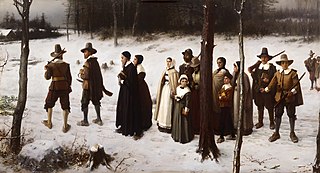
Fundamentalism is a tendency among certain groups and individuals that is characterized by the application of a strict literal interpretation to scriptures, dogmas, or ideologies, along with a strong belief in the importance of distinguishing one's ingroup and outgroup, which leads to an emphasis on some conception of "purity", and a desire to return to a previous ideal from which advocates believe members have strayed. The term is usually used in the context of religion to indicate an unwavering attachment to a set of irreducible beliefs.
Christian fundamentalism, also known as fundamental Christianity or fundamentalist Christianity, is a religious movement emphasizing biblical literalism. In its modern form, it began in the late 19th and early 20th centuries among British and American Protestants as a reaction to theological liberalism and cultural modernism. Fundamentalists argued that 19th-century modernist theologians had misunderstood or rejected certain doctrines, especially biblical inerrancy, which they considered the fundamentals of the Christian faith.

Dietrich Bonhoeffer was a German Lutheran pastor, theologian and anti-Nazi dissident who was a key founding member of the Confessing Church. His writings on Christianity's role in the secular world have become widely influential; his 1937 book The Cost of Discipleship is described as a modern classic. Apart from his theological writings, Bonhoeffer was known for his staunch resistance to the Nazi dictatorship, including vocal opposition to Adolf Hitler's euthanasia program and genocidal persecution of the Jews. He was arrested in April 1943 by the Gestapo and imprisoned at Tegel Prison for 1½ years. Later, he was transferred to Flossenbürg concentration camp.
The Third Great Awakening refers to a historical period proposed by William G. McLoughlin that was marked by religious activism in American history and spans the late 1850s to the early 20th century. It influenced pietistic Protestant denominations and had a strong element of social activism. It gathered strength from the postmillennial belief that the Second Coming of Christ would occur after mankind had reformed the entire Earth. It was affiliated with the Social Gospel movement, which applied Christianity to social issues and gained its force from the awakening, as did the worldwide missionary movement. New groupings emerged, such as the Holiness movement and Nazarene and Pentecostal movements, and also Jehovah's Witnesses, Spiritualism, Theosophy, Thelema, and Christian Science. The era saw the adoption of a number of moral causes, such as the abolition of slavery and prohibition.
Pietism, also known as Pietistic Lutheranism, is a movement within Lutheranism that combines its emphasis on biblical doctrine with an emphasis on individual piety and living a holy Christian life.
Jewish fundamentalism refers to fundamentalism in the context of Judaism. The term fundamentalism was originally used in reference to Christian fundamentalism, a Protestant movement which emphasizes a belief in biblical literalism. Today, it is commonly used in reference to movements that oppose modernist, liberal, and ecumenical tendencies within societies as well as modernist, liberal and ecumenical tendencies within specific religions and it is often coupled with extremist ideologies and/or political movements. The use of this definition is important in a Jewish context because the two movements which are most commonly associated with Jewish fundamentalism, Religious Zionism and Haredi Judaism, stray far from biblical literalism due to the importance of the Oral Law within Judaism. In fact, Karaism, the Jewish movement which is well-known due to its emphasis on biblical literalism, is rarely considered fundamentalist.
Civil religion, also referred to as a civic religion, is the implicit religious values of a nation, as expressed through public rituals, symbols, and ceremonies on sacred days and at sacred places. It is distinct from churches, although church officials and ceremonies are sometimes incorporated into the practice of civil religion. Countries described as having a civil religion include France and the United States. As a concept, it originated in French political thought and became a major topic for U.S. sociologists since its use by Robert Bellah in 1960.
Religion in the United States is widespread and diverse, with the country being far more religious than other wealthy Western nations. An overwhelming majority of Americans believe in a higher power, engage in spiritual practices, and consider themselves religious or spiritual. Christianity is the most widely professed religion, with the majority of Americans being Evangelicals, Mainline Protestants, or Catholics.
Clerical fascism is an ideology that combines the political and economic doctrines of fascism with clericalism. The term has been used to describe organizations and movements that combine religious elements with fascism, receive support from religious organizations which espouse sympathy for fascism, or fascist regimes in which clergy play a leading role.

Jonathan Zittell Smith, also known as J. Z. Smith, was an American historian of religions. He was based at the University of Chicago for most of his career. His research included work on such diverse topics as Christian origins, the theory of ritual, Hellenistic religions, Māori cults in the 19th century, and the mass suicide in Jonestown, Guyana, as well as methodological studies on such common scholarly tools as description, comparison, and interpretation. An essayist, his works include Map Is Not Territory, Imagining Religion: From Babylon to Jonestown,To Take Place: Toward Theory in Ritual,Drudgery Divine: On the Comparison of Early Christianities and the Religions of Late Antiquity,Relating Religion: Essays in the Study of Religion, and a collection of his writings on pedagogy, On Teaching Religion.

Jaroslav Jan Pelikan Jr. was an American scholar of the history of Christianity, Christian theology, and medieval intellectual history at Yale University.
The University of Chicago Divinity School is a private graduate institution at the University of Chicago dedicated to the training of academics and clergy across religious boundaries. Formed under Baptist auspices, the school today lacks any sectarian affiliations.
Bruce Lincoln is Caroline E. Haskell Distinguished Service Professor Emeritus of the History of Religions in the Divinity School of the University of Chicago, where he also holds positions in the Center for Middle Eastern Studies, Committee on the Ancient Mediterranean World, Committee on the History of Culture, and in the departments of Anthropology and Classics. Before his arrival at the University of Chicago, Lincoln taught at the University of Minnesota (1976–1994), where he co-founded the Program in Comparative Studies in Discourse and Society.
The Fundamentals: A Testimony To The Truth is a set of ninety essays published between 1910 and 1915 by the Testimony Publishing Company of Chicago. It was initially published quarterly in twelve volumes, then republished in 1917 by the Bible Institute of Los Angeles as a four-volume set. Baker Books reprinted all four volumes under two covers in 2003.
The Fundamentalism Project was an international scholarly investigation of conservative religious movements throughout the world, funded by the American Academy of Arts and Sciences. The project began in 1987, directed by Martin E. Marty and R. Scott Appleby, concluding in 1995. The understanding of fundamentalism framing the project was considered controversial in some cases, though even those scholars with criticism of the assumptions upon which the project was based admit that there is a great deal of useful empirical information to be found in the publications that grew out of the project.

Vibhuti Narain Rai is an ex police officer and author from India. He obtained an M.A. in English literature from Allahabad University in 1971 and joined the Indian Police Service in 1975 as a part of the Uttar Pradesh cadre. He served many sensitive districts as a superintendent of police.
Protestantism and Islam entered into contact during the early-16th century when the Ottoman Empire, expanding in the Balkans, first encountered Calvinist Protestants in present-day Hungary and Transylvania. As both parties opposed the Austrian Holy Roman Emperor and his Roman Catholic allies, numerous exchanges occurred, exploring religious similarities and the possibility of trade and military alliances.
Martin Riesebrodt was a German-American professor of sociology and politics at the Graduate Institute of International and Development Studies, in Geneva, Switzerland. He was also emeritus professor at the Divinity School and the Department of Sociology at the University of Chicago. He earned his doctorate at Heidelberg University, and his habilitation at Ludwig Maximilian University of Munich.

Protestantism is the largest grouping of Christians in the United States, with its combined denominations collectively comprising about 43% of the country's population in 2019. Other estimates suggest that 48.5% of the U.S. population is Protestant. Simultaneously, this corresponds to around 20% of the world's total Protestant population. The U.S. contains the largest Protestant population of any country in the world. Baptists comprise about one-third of American Protestants. The Southern Baptist Convention is the largest single Protestant denomination in the U.S., comprising one-tenth of American Protestants. Twelve of the original Thirteen Colonies were Protestant, with only Maryland having a sizable Catholic population due to Lord Baltimore's religious tolerance.

Robert Scott Appleby is an American historian, focusing in global religion and its relationship to peace and conflict, integral human development, and comparative modern religion. He is a Professor of history at the University of Notre Dame, and currently the Marilyn Keough Dean of the Keough School of Global Affairs.






